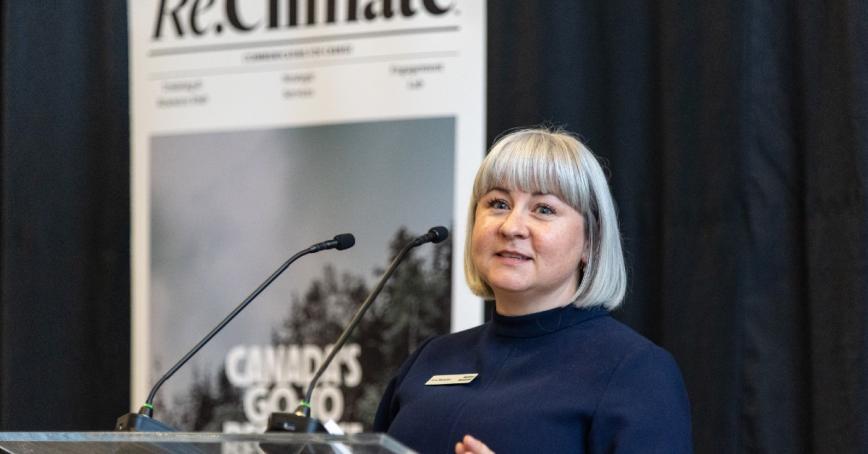Peer-to-peer conversations explore climate change
Topics
Featured
Share online

Learn more about Royal Roads Master of Arts in Environmental Education and Communications program.
If you think talking climate change and energy transition in Canada’s oil patch province might be difficult, think again. Amber Bennett, who has been passionate about the environment since she was a child, credits her time in Royal Roads’ Master of Arts in Environmental Education and Communications program with influencing Re.Climate’s focus on translating research into action: “It was a lot of work, but it was also a joy. And it allowed me to knit together many different parts of myself — as a parent, a professional and an environmentalist.”
Bennett is the executive director of Re.Climate, which describes itself as “Canada's go-to centre for training, research and strategy on climate change communications and public engagement”. Bennett says the goal of the centre's Alberta Narratives Project “was to better understand how do we talk about climate change and energy transition in Alberta.” The project has found two key factors in such conversations are who’s doing the talking and what they’re worried about.
“This and subsequent research have found that in many ways, Albertans think and act like most other Canadians,” she says. “We tend to think we’re wildly different — both from each other and the rest of Canada — but we’re not. We’re far less polarized on this issue than some would have us believe.”
“How are different groups in Alberta thinking about climate change and energy transition? Where is there common ground across those different groups and where are there differences?”
To answer those questions, she explains, peers hosted conversations within their communities — farmers hosted farmers, for instance, while teachers, activists, oil and gas workers, tradespeople, health care workers and policy makers hosted their own peer discussions.
“That’s really interesting because you get a much more purified version of how people are actually thinking and talking, and what are the issues or concerns or hopes they have,” Bennett says.
What they said proved enlightening.
“Climate change and energy transition are deeply destabilizing for this place [Alberta] given the reliance of the economy on oil and gas production. So, sometimes what we see — whether it’s polarization [around climate change] or maybe it’s denial, misinformation, etc. — really comes from a need for security and more certainty.”
Bennett adds: “It was really clear that wherever people stood on what they think about climate change, there’s a lot of common ground around the need to get out of the boom-and-bust cycle here, and there’s a really broad appeal for diversification.”
Still, while she notes that three quarters of Albertans are on board for a transition to cleaner energy and associated industries, she says challenges remain to build bridges in a province where a great deal of effort has been put into creating an oil and gas identity. She says that people, not industry, are the key to transition.
When speaking to individuals or groups of people, Bennett says, “No one right word is going to get you there. You fundamentally need to lean in and listen to them and then talk to them about what they care about, otherwise, it’s a waste of time.
“We’re kind of at the point where we need to get past the moral conversation. Most people don’t question the need to act on climate. It’s really about making it relevant to them and talking to them about things that give them a sense of control to enhance their own lives.”
Learn more about Royal Roads Master of Arts in Environmental Education and Communications program.